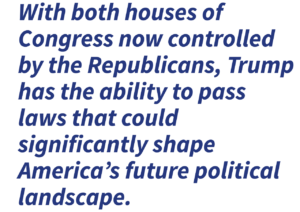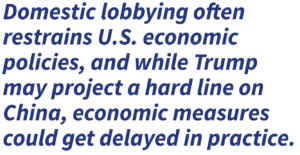Dr. Jeffrey Michaels: “America’s image doesn’t always match to the reality of its power”

Jeffrey Michaels, one of the leading voices in foreign policy, decision-making and international security, explains the impact of recent elections in the United States and the future of its relationships with the rest of the world. During 4 years (2020-2024), Dr. Michaels has been the IEN Senior Fellow in American Foreign Policy and International Security at the Institut Barcelona d’Estudis Internacional (IBEI), offering a unique perspective on the ever-evolving geopolitical landscape. Additionally, he has served as a visiting researcher in the Department of War Studies at King’s College London and at the Changing Character of War Centre at Pembroke College, Oxford, providing a rich and global perspective on the subject.
Following Donald Trump’s sweeping victory over Kamala Harris in the 2024 U.S. Presidential election, Michaels shares insights on the likely impact of Trump’s leadership across international politics, U.S. domestic policy, and pressing geopolitical issues.
We all seem to think that the U.S. is the most powerful country in the world, its indisputable leader. However, has this American global perception a real effect on its influence?
America’s image doesn’t always match to the reality of its power, apparently acting with nearly limitless influence, which creates a complicated dynamic in international relations. Both political and academic rhetoric, especially when words such as ‘hegemony’ or superpower’ are used, can completely alter its perceived influence, sometimes divorced from reality. It can also prompt other nations to act more or less aggressively, creating an atmosphere that doesn’t always align with the U.S.’s real intentions or capabilities.
Having this in mind, can the U.S. still be considered the world’s ‘referee’?
The U.S. role has always been overstated. Its power is far less about guiding events and more about adapting to them as they unfold, and its reach has limits. Take NATO, for example. While the U.S. has been a leading force in the alliance, there are real limitations to its influence, and not every European country toes the American line. We saw this not too long ago when the U.S. wanted both Finland and Sweden to join the Alliance but was opposed by Turkey and Hungary, who delayed the process for months. The U.S. presence is often felt through economic measures or through cultural influence rather than direct military intervention.
 What are U.S.’s biggest limitations? Specially under Trump’s leadership.
What are U.S.’s biggest limitations? Specially under Trump’s leadership.
The U.S. undeniably has one of the world’s most powerful militaries, and most importantly, has the ability to move its forces around the world through its network of global bases. However, even Trump with his promises of American resurgence, faces unavoidable constraints across the economic, political, diplomatic as well as military spectrum. For example, like-minded countries that might have been willing to join a military coalition if Harris won may be unwilling to join a coalition now that Trump is in office, assuming of course he’d ask them to join in the first place, which is probably unlikely.
What kind of constraints are you referring to?
The U.S. faces challenges on multiple fronts and often struggles with a “crisis attention deficit disorder,” where its focus shifts from one international crisis to the next, never staying long enough to see lasting change. Under Trump, the priority will likely be on symbolic displays of power rather than long-term strategic changes, which could leave unresolved tensions in key areas.
Now that Trump is settling into his new mandate, what challenges might he face in the legislative arena?
With both houses of Congress now controlled by the Republicans, Trump has the ability to pass laws that could significantly shape America’s future political landscape. Expect a strong push for legislation that consolidates Republican power in areas like voting laws, takes a much tougher stance on immigration, and pushes back various social policy initiatives. But there’s a real danger that these moves could fuel public unrest if they go too far.

Are you implying some sort of civil mobilization against the government?
Historically, Republicans have been wary of pushing too far, understanding that too much instability can backfire. However, Trump’s leadership style could test these boundaries. If Republican-led legislation begins to affect fundamental democratic processes, protests and pushback could intensify, leading to a volatile domestic situation.
How has Trump’s campaign strategy evolved since last time?
The Trump campaign was remarkably disciplined. Compared to 2016, when Trump’s candidacy was marked by chaos and spontaneity, this election saw a far more structured approach. Standards of political conduct that existed before have shifted so dramatically that actions once considered unacceptable are now commonplace. Trump’s influence has reshaped the Republican Party from the inside out, aligning it with his agenda and outlook.
Why did Trump ultimately win?
Several reasons. For one there was obviously much more disaffection with the Democratic Party than was obvious in much of the polling. Trump’s campaign capitalized on his constant media presence, legal strategies at the state-district level that affected voting, and precise voter mobilization. In many ways, the Republican Party itself has transformed to reflect Trump’s vision and tactics. All headlines, including in center-left newspapers like the New York Times and TV channels such as MSNBC were about Trump, and Harris was somewhere down below. This constant visibility created a perception of inevitability and his base, being mobilized and energetic, turned out in unprecedented numbers.
Was Harris a strong opponent?
Kamala Harris faced an uphill battle as the Democratic candidate. Having served as a silent Vice President, she was in a difficult position to distance herself from Biden’s policies without appearing disloyal to her own administration. Harris didn’t have a distinct policy platform that set her apart from Biden, which made it hard for voters to envision what she would do differently. Not being able to mobilize key groups, including African American males and other minorities, likely cost her the election.

How could NATO be affected under Trump?
There are serious concerns about NATO’s future. There’s a slight possibility that Trump could invoke Article 13 of the North Atlantic Treaty to signal a U.S. withdrawal, or alternatively, he could stay politically in NATO but reduce America’s military commitments. Another possibility is that Trump might link U.S. support to defense spending levels, insisting that allies meet a specific threshold to receive American military support in times of crisis.
And what can we expect on U.S. foreign policy? Taking a special consideration in the ongoing armed conflicts across the world.
Trump’s stance on diplomacy is often contradictory. He’s built alliances with leaders like Putin, while simultaneously overseeing policies that challenge Russian interests, such as nuclear arms modernization and a military buildup. We can also expect him to better relations with far-right governments in Hungary, Italy, Poland… whoever he befriends as long as they serve his interests.
How might Trump’s presidency impact key geopolitical conflicts?
As we’ve mentioned, it could lead to a shift in U.S. foreign policy on the Ukraine war that favors Russia’s goals, potentially making a resolution more aligned with their interests. This expectation encourages Russia to hold its ground and gain as much territory as possible, hoping for some sort of ceasefire in the new year rather than a peace agreement. In Israel, Trump might adopt a less interventionist stance, likely maintaining support without pushing Netanyahu as hard to halt conflicts.
Is there a nuclear risk with Trump?
Despite concerns, the U.S. has a series of checks, safeguards and protocols to prevent any sudden or arbitrary nuclear decisions in which there is no direct immediate nuclear threat to the US; Trump can’t simply get away with ordering a nuclear strike on Russia, for instance, just because he is in the mood to do so. However, the international nuclear landscape is more tense than ever, with countries like China, Russia, and North Korea expanding their arsenals, and Iran on the brink of acquiring one. Interestingly, the risk of nuclear escalation doesn’t rest solely with Trump. Nuclear build-up is happening regardless of who’s in the White House.

What will Trump’s stance be on China during the next four years in government?
The U.S. is likely to pursue even tougher policies on China, potentially by escalating economic tensions. Trump’s inclination to increase tariffs could ignite, or exacerbate depending on one’s perspective, a trade war, which may damage U.S.-China relations even further. Nevertheless, domestic lobbying often restrains U.S. economic policies, and while Trump may project a hard line on China, economic measures could get delayed in practice.
Is the U.S. living in a new Cold War with China?
It seems like it. However, there are critical differences on how we understand the concept of “Cold War”. China isn’t interested in spreading an ideology globally like the Soviet Union did and lacks global military infrastructure. Instead, it’s focused on pragmatic interests, like securing resources and building trade partnerships; it’s more about economic competition and regional power dynamics.
*The Institute of Nord-american Studies wants to express its gratitude to Dr. Jeffrey Michaels after four impactful years as IEN Senior Fellow at IBEI. As a skilled researcher and a remarkable professional, Jeffrey has inspired us all, sharing his knowledge generously and supporting students and colleagues alike. We’ll miss his insight, humor, and friendship, and we’re grateful for everything he’s brought to our community. Best of luck on your next adventure.






